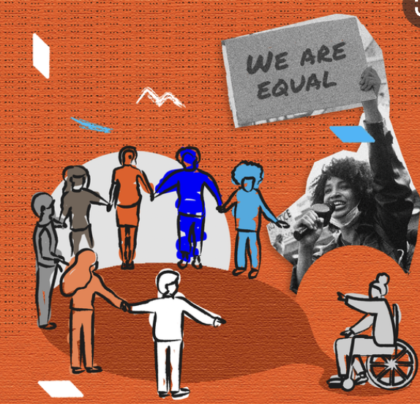 As Unitarian Universalists, we hold sacred the inherent worth and dignity of every person. In the practice of our values, this means we care for those suffering from society’s indifference and marginalization, with an eye and ear for those facing the most egregious harms.
As Unitarian Universalists, we hold sacred the inherent worth and dignity of every person. In the practice of our values, this means we care for those suffering from society’s indifference and marginalization, with an eye and ear for those facing the most egregious harms.
The Build Back Better legislation does take bold action as a once-in-a-lifetime opportunity. It is a meaningful recalibration to a more just ‘new normal,’ a more just ‘new equilibrium’ between people and the economy. But it represents the minimum needed for sowing seeds of a compassionate and faithful recovery. It is not a glide-path toward a people-centered economy nor the paradigm shift of action needed for the environment and crisis response to climate change. And it is an insufficient substitute for the long-promised, and discussed comprehensive immigration reform.
Yet the expected positive results for children, working families, and immigrants are significant. The steps for the environment are urgent first steps toward our national resilience, human species continuation, and protecting planetary biodiversity.
America needs this package — from universal pre-K to expanded Child Tax Credits and EITC (Earned Income Tax Credits), from Medicaid expansions to housing funding for affordable homes, from reductions in greenhouse gases to necessary reform of our broken and hostile immigration system. And America wants it now.
While this is a good bill, many UUSJ allies observe that much more could be done, should be done for our families — and we agree.
Like paid medical and family leave, or real pathways to citizenship as well as viable routes to permanent residency. It should have been larger and closer to the original proposals, which would have generated an even greater economic impact. A showcase of more American ingenuity and gumption: more assistance for working families, more intervention opportunities to end multigenerational poverty. Bigger goals on greenhouse gases. Programs and strategies that democratize access to the prospect of “liberty and justice for all.”
This is particularly stark when viewed in comparison to the military-industrial complex spending we as Americans are asked to bear.
“Congress is projected to spend more than $7 trillion on the Pentagon over the next 10 years, which is more than double the cost of the Build Back Better Act over the same timeframe.” (Sources: Friends Committee on National Legislation (FCNL) Tweet and the 10/19 Newsweek Article they shared as a source.)
Like so many efforts in recent decades, the least powerful and most vulnerable in our communities suffer even when noteworthy progress is made. Clearly, the need for faith-grounded advocacy like ours remains evident.
It brings to the fore the perennial tension in social justice work and federal direct advocacy.
- Does the principled stance outweigh the practical deal when they conflict?
- Do we focus on the macro system-wide harm and injustice or the micro policy-area harm and injustice?
- Is confronting procedural matters, such as the filibuster, or the parliamentarian’s role acting for justice?
- Is maneuvering and negotiating around obstacles such as a power block of a few, or two, senators acting for justice?
- How do we balance the justice aims in different policy areas when they come into conflict?
For UUSJ, these tensions played out in the First Step Act of 2018, which passed into law. And, proposals such as The Raise the Wage Act (2019), The U.S. Citizenship Act (2021), The Farm Workforce Modernization Act (2021), The For the People Act (2021), and The Freedom to Vote Act (2021). They are on the horizon for the John Lewis Voting Rights Advancement Act (2021), and fully on display with the Build Back Better Act and Infrastructure packages now.
Rev. Dr. William J. Barber II succinctly characterized the legislative politics and the liabilities, in a recent Tweet 10/28:
“Dems, be careful. If you give Manchin & Sinema infrastructure w/o having them vote for BBB, they will not keep their promise. They have done nothing to be trusted. Really there should be a three-fold agreement: you get infrastructure if you support BBB, VRA & For the People Act.”
I have no easy answers. Especially as UUSJ strives to be in more and better accountable relationships with our moral owners.
I do know we may not win every exchange. We may not convince those we want to. We may not achieve the outcomes we desire this time around. But we will continue to advocate, witness and educate toward an inclusive democracy, a people-centered economy, a just and dignified immigration system, and care for the interdependent web-of-life. And we will support actions in the federal forum that interrupt racial injustice.

During this time of continued crisis, members of Congress must act knowing that history will judge them, and we judge them, by their votes on Build Back Better. We are watching how they treat the least powerful, the most marginalized and the easily silenced among us.
We say start with Build Back Better, end in justice.
Pablo DeJesus, UUSJ Executive Director

